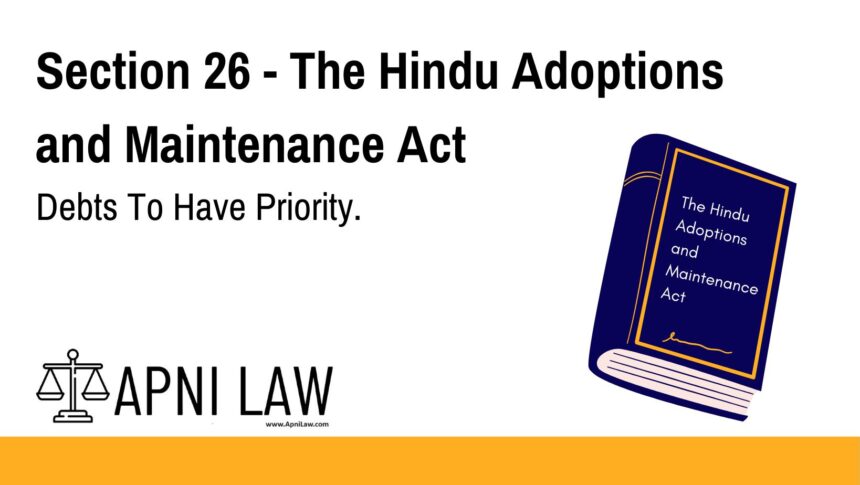Code: Section 26 of The Hindu Adoptions and Maintenance Act, 1956
“Subject to the provisions contained in section 27, debts of every description contracted or payable by the deceased shall have priority over the claims of his dependants for maintenance under this Act.”
Explanation of Section 26
Section 26 of the Hindu Adoptions and Maintenance Act clarifies the legal hierarchy of financial obligations following a person’s death. It states that any outstanding debts owed by the deceased must be settled before any claims for maintenance by dependants are considered. In other words, the lawful creditors of the deceased have the first right to the deceased’s estate, and only the remaining estate, if any, can be used to satisfy maintenance obligations.
This section is subject to the exceptions and rules outlined in Section 27, which deals with the specific nature of property from which maintenance may be claimed.
Key Points:
- Debts have priority over maintenance claims.
- Applies to debts of “every description” — personal loans, business debts, credit dues, etc.
- Maintenance claims by dependants are secondary and can only be fulfilled after debts are discharged.
- The provision operates subject to Section 27, which may limit the application of this rule depending on the nature of the property involved.
Illustration
Example: A deceased individual leaves behind an estate worth ₹10 lakhs. He also has outstanding loans and credit card dues amounting to ₹7 lakhs. His dependent mother applies for maintenance under this Act.
In this case, the outstanding debts (₹7 lakhs) must be paid first. Only the remaining ₹3 lakhs (if any) can be considered for fulfilling maintenance claims. If the debts exceed the total value of the estate, the dependants’ maintenance claim may not be satisfied at all.
Common Questions and Answers on Section 26
- What types of debts take priority under Section 26?
- All lawful debts, including secured and unsecured debts, personal loans, medical bills, and other financial liabilities.
- Does this mean dependants might not receive any maintenance?
- Yes, if the deceased’s debts exceed or exhaust the estate’s value, maintenance claims may not be enforceable.
- What role does Section 27 play in this context?
- Section 27 specifies the kind of property from which maintenance can be claimed and may limit the enforceability of this priority in certain cases.
- Can dependants challenge the validity of debts?
- Yes, dependants may question the legitimacy or enforceability of specific debts if they believe such claims are fraudulent or invalid.
- Is there a fixed portion of the estate reserved for dependants regardless of debts?
- No, under this Act, there is no fixed reservation. Debts must be paid first before dependants can claim maintenance.
Conclusion
Section 26 of the Hindu Adoptions and Maintenance Act ensures that legal debts of a deceased individual are cleared before any dependent can assert a right to maintenance. It upholds the financial integrity of the estate distribution process by establishing a clear order of priority. Dependants, while protected under the Act, must be mindful that their rights are subordinate to the legal obligations left behind by the deceased.
For more insights on inheritance rights, estate distribution, and maintenance law, visit ApniLaw.







